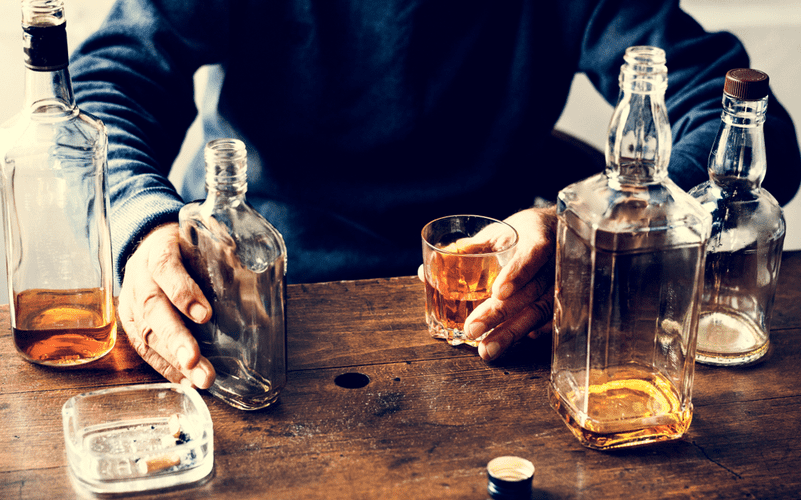It’s best to go through an alcohol detox with the help of skilled healthcare professionals who can help you manage the uncomfortable symptoms and potential dangers of alcohol withdrawal. However, it’s important to know the signs of alcohol poisoning, especially after an episode of binge drinking. When you drink alcohol, it’s absorbed into your bloodstream through your stomach and small intestine. From there, it travels to your liver, where it is metabolized into acetaldehyde and then into acetate. But, when you’ve been drinking, your liver is madly metabolising all the alcohol, breaking it down to get it out of your blood stream.
- Studies show different results about how alcohol use affects menopause symptoms.
- Therefore, toxic alcohol byproducts stay in your body, making you feel sick.
- This is just one of the many strange effects of alcohol on the body.
- Acetaldehyde is a reactive chemical compound that has biological potencies.
- Heavy drinking means eight or more drinks a week for women and 15 or more for men.
Take our short alcohol quiz to learn where you fall on the drinking spectrum and if you might benefit from quitting or cutting back on alcohol. Alcohol withdrawal may be treated pharmacologically under a physician’s guidance. This involves alcohol detoxification and taking medications such as benzodiazepines (Valium, Ativan), carbamazepines (Tegretol, Depakote), valproic acid, or other types of drugs. Resting lowers the level of bodily activities and slows down the metabolism process thus minimizing the amount of heat released.
Does Physiological Dependence Mean You’re Addicted to Alcohol?
Some liquors and spirits are even consumed during the winter and in cold places to warm people up. Alcohol widens your blood vessels, making more blood flow to your skin. The heat from that extra blood passes right out of your body, causing your temperature to drop. On the other hand, long-term heavy drinking boosts your blood pressure. It makes your body release stress hormones that narrow blood vessels, so your heart has to pump harder to push blood through. If someone has developed alcohol dependency, they may experience excessive sweating, hot flashes, and night sweats if they stop drinking.

The real health risks come after prolonged and continued exposure to acetaldehyde and excessive alcohol consumption. However, it’s important to understand that you’ll be exposing yourself to toxic acetaldehyde when you drink alcohol. Like hangover symptoms, hot flashes and sweating from AWS occur because alcohol withdrawal triggers your fight-or-flight response. Usually, alcohol has a calming impact on your brain, making your brain highly sensitive to glutamate, a chemical that excites your brain. Without alcohol in your system, your brain can become over-excited quickly.
Are night sweats a sign of alcohol withdrawal?
Some might confuse this condition with an alcohol allergy, but that is actually extremely rare. If you feel these types of symptoms when drinking alcohol, but to an extreme level, it’s important to speak to your doctor before drinking alcohol again. Check out our article regarding cancer why does alcohol make you hot risks and acetaldehyde for more details. If you experience these symptoms along with regular night sweats, you may be going through alcohol withdrawal. If you have night sweats along with some of the following symptoms, it could be a sign that you’re going through alcohol withdrawal.
- It can also lead to irritation of the lining of the stomach, called gastritis.
- You may sweat due to the heat if you may be drinking in an outdoor environment or under the sun, of course!
- If you experience these symptoms along with regular night sweats, you may be going through alcohol withdrawal.
- This combined with much more heat being produced by your liver really makes you heat up in the night.
- You can read the in-depth Expert’s Guide to Breaking down Acetaldehyde to find out more about this harmful chemical.
Over time, heavy drinking makes the organ fatty and lets thicker, fibrous tissue build up. That limits blood flow, so liver cells don’t get what they need to survive. As they die off, the liver gets scars and stops working as well, a disease called cirrhosis. While hangovers are bound to happen the morning after, understanding the limits on how far fevers and hangover symptoms chills should go can help judgment on when to seek medical help. Always follow the instructions on how to cope with these hangover effects.
Hangover Hot Flashes and Sweating
Dr Jain says, “Alcohol impacts the central nervous system, the circulatory system, and every part of your body. Thus, drinking leads to an increased heart rate and widens blood vessels in your skin.” This tends to trigger perspiration. When these toxic byproducts remain in the body, side effects like flushed skin, nausea, vomiting, rapid heart rate, headache, and more can occur. Women going through menopause also experience hot flashes naturally and drinking alcohol can worsen these symptoms. When you drink alcohol, your brain cells tell your blood vessels to expand to get rid of the extra heat. When the vessels expand, you might feel even warmer because of the increased blood flow inside the blood vessels beneath your skin.

According to him, there are multiple reasons that can lead to this problem, and the amount of alcohol also has a major role to play. No points for guessing that high body temperature and increased heart rate https://ecosoberhouse.com/ are the biggest culprits here. The heat can increase depending on how quickly you’re drinking and how much. If you only have one drink in an hour, your body can break down that alcohol amount easily enough.
Other Causes of Alcohol Hot Flashes
Alcohol can cause some people to feel hot and may lead to night sweats. This occurs when alcohol affects the nervous system and how the body regulates and senses body temperature, blood pressure, and heart activity. While this may seem like a perk, it can actually be quite dangerous.
Why Am I Sweating in My Sleep? – Verywell Health
Why Am I Sweating in My Sleep?.
Posted: Sat, 11 Nov 2023 08:00:00 GMT [source]
Alcohol withdrawal is a common reaction in people with alcohol use disorders when they suddenly stop drinking or go a while without having alcohol. Alcohol withdrawal syndrome (AWS) is usually an uncomfortable process, which is why it’s recommended that people undergo medical detox to safely recover from withdrawal. Alcohol hot flashes can also occur if you have a hangover the day after drinking alcohol. During a hangover, your body temperature rises from the low temperature you probably experienced while you were intoxicated. During this time, the body was attempting to cool itself down. Of course, the occasional alcoholic beverage shouldn’t be an issue, even for those with alcohol intolerance.